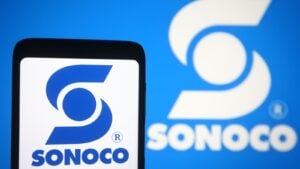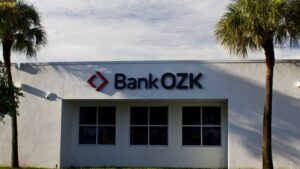With the market’s strong rally, dividend yields have sunk. The S&P 500 currently yields just 1.4% right now. Rising valuations and falling dividend yields have made many stocks overvalued.
However, there are still quality blue-chip dividend payers with reasonable valuations. These 3 dividend stocks have above-market dividend yields, earnings growth, and also appear undervalued, which could lead to high total returns in the years ahead.
Sonoco Products (SON)

Sonoco Products (NYSE:SON) provides packaging, industrial products and supply chain services to its customers. The markets that use the company’s products include those in the appliances, electronics, beverage, construction and food industries. The company generates nearly $7 billion in annual sales. Sonoco Products is now composed of two major segments: Consumer Packaging and Industrial Packaging.
Sonoco is a Dividend Champion, as it has increased its dividend for 41 consecutive years. On Feb. 14, 2024, Sonoco Products announced fourth quarter and full year results. For the quarter, revenue declined 1.8% to $1.64 billion, but this was $20 million above expectations. Adjusted earnings per share of $1.02 compared unfavorably to $1.27 in the prior year. For 2023, revenue decreased 6% to $6.8 billion while adjusted EPS of $5.26 compared unfavorably to $6.48 in the prior year. This was, however, the company’s second-best adjusted EPS result in its history.
Sonoco Products provided an outlook for 2024 as well, with the company expecting adjusted EPS of $5.10 to $5.40 for the year. The company has grown earnings per share at a rate of 8.4% since 2014. We maintain our forecast growth rate of 5% due to the high base from which earnings are starting.
Bank OZK (OZK)

Bank OZK (NASDAQ:OZK) is a regional bank that offers services such as checking, business banking, commercial loans and mortgages to its customers in Arkansas, Florida, North Carolina, Texas, Alabama, South Carolina, New York and California. The bank was founded in 1903 and is headquartered in Little Rock, Arkansas.
Bank OZK has an impressive dividend growth history. On Jan. 2, 2024, the company announced a 38-cent quarterly dividend, representing a 2.7% raise over the last quarter’s payment and an 11.8% raise year over year. This marks its 54th consecutive quarter of raising its dividend.
Its dividend growth is possible because of its strong fundamentals. In mid-January, Bank OZK reported financial results for the fourth quarter of fiscal 2023. Total loans and deposits grew 27% and 28%, respectively, over last year’s quarter. Net interest income grew 11% over the prior year’s quarter, in sharp contrast to most banks, which incurred a decline in net interest income due to higher costs of deposits.
EPS grew 12%, from $1.34 to a new all-time high of $1.50, and exceeded the analysts’ consensus by 5 cents.
We believe that Bank OZK will remain on its growth trajectory. Factors like general economic growth, a low payout ratio and coming off a low EPS base should help results. Non-interest income makes up just a small amount of its profits. Due to the record EPS expected this year, we expect 2% EPS growth over the next five years.
In the meantime, shares appear significantly undervalued with a 2024 P/E of 7x, compared with our fair value estimate of 11x. The stock is now trading at a lower valuation due to the broader selloff of regional banks. Still, if OZK stock trades at a P/E of 11x within five years, it would see a 9.5% annualized gain in its returns.
OZK stock has a current dividend yield of 3.6%, which means total returns could reach 15.1% over the next five years.
Bristol-Myers Squibb (BMY)

Bristol-Myers Squibb (NYSE:BMY) is a leading healthcare company. Its top three selling pharmaceuticals, Revlimid, Opdivo and Eliquis, have shown solid growth rates and are expected to see high peak annual sales. The stock has a market capitalization of approximately $100 billion.
In Q4 2023, revenue grew slightly to $11.48 billion. Adjusted EPS of $1.70 compared to $1.82 in the prior year and was 12 cents ahead of estimates. For 2023, revenue decreased 2.6% to $45 billion while adjusted EPS of $7.51 compared to $7.70 in the prior year.
For 2024, BMY expects revenue to grow in the low single-digits. Adjusted earnings are projected to be in a range of $7.10 to $7.40 for the year. The company is expected to remain highly profitable, yet shares trade for a relatively low valuation.
We are reaffirming our target multiple of 11 times earnings. This brings Bristol-Myers’ valuation more in line with its medium-term average valuation. Still, BMY stock trades for just 6.7 times the midpoint of 2024 EPS guidance. Therefore, the stock seems to be undervalued in our view.
For example, if the P/E multiple for BMY expanded from 6.7x to 11x over the next five years, it would increase annual returns by 10.4% over that period. Combined with 3% annual EPS growth and the 4.6% dividend yield, BMY stock could generate total returns of 18% per year over the next five years.
On the date of publication, Bob Ciura did not hold (either directly or indirectly) any positions in the securities mentioned in this article. The opinions expressed in this article are those of the writer, subject to the InvestorPlace.com Publishing Guidelines.
Bob Ciura has worked at Sure Dividend since 2016. He oversees all content for Sure Dividend and its partner sites. Prior to joining Sure Dividend, Bob was an independent equity analyst. His articles have been published on major financial websites such as The Motley Fool, Seeking Alpha, Business Insider and more. Bob received a bachelor’s degree in Finance from DePaul University and an MBA with a concentration in investments from the University of Notre Dame.
